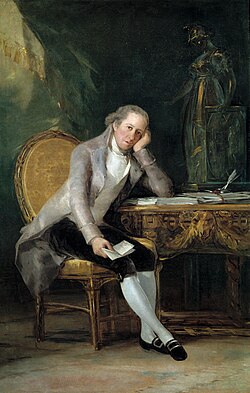Gaspar Melchor de Jovellanos
| Gaspar Melchor de Jovellanos | |
|---|---|

Jovellanos painted by Goya
|
|
| Born |
5 January 1744 Gijón, Asturias, Spain |
| Died | 27 November 1811 (aged 67) Vega de Navia, Spain |
| Occupation | Author, philosopher |
Gaspar Melchor de Jovellanos (born Gaspar Melchor de Xove y Llanos, 5 January 1744 – 27 November 1811) was a Spanish neoclassical statesman, author, philosopher and a major figure of the Age of Enlightenment in Spain.
Gaspar Melchor de Jovellanos was born at Gijón in Asturias, Spain. Selecting law as his profession, he studied at Oviedo, Ávila, and the University of Alcalá, before becoming a criminal judge at Seville in 1767.
His integrity and ability were rewarded in 1778 by a judgeship in Madrid, and in 1780 by appointment to the council of military orders. In the capital Jovellanos took a good place in the literary and scientific societies; he was commissioned by the Society of Friends of the Country (Madrid's economic society) in 1787 to write his most well-known and influential work, Informe en el expediente de ley agraria ("A report on the dossier of the Agrarian Law"), a project which he completed in 1794, and published in 1795.
In his work on agrarian law, he called on the crown to eliminate the concentration of land ownership in the entailment of landed estates, ownership of land by the Catholic Church, and the existence of common lands unavailable to private ownership. In his view, Spain's wealth lay in its agricultural productivity which would allow its population to grow and prosper. In the eighteenth-century regime of land tenure, productivity was stifled by latifundia of the political elites and the Catholic Church as an institution, and common lands where there was no incentive for individuals to invest in its productivity. Jovellanos was influenced by Adam Smith's The Wealth of Nations (1776), which saw self-interest as the motivating force for economic activity. Jovellanos's recommendations were not implemented in Spain, but did influence thinking about agrarian land reform in the viceroyalty of New Spain by Bishop Manuel Abad y Queipo in the early nineteenth century before its independence in 1821, whose writings influenced Alexander von Humboldt's thinking and writing on land issues in Mexico. Jovellanos also influenced thinking about agrarian land reform in Mexico in the late period of President Porfirio Díaz's regime by Andrés Molina Enríquez, who was the intellectual father of the article of the post Mexican Revolution Constitution of 1917 that empowered the State to expropriate land and other resources.
...
Wikipedia
